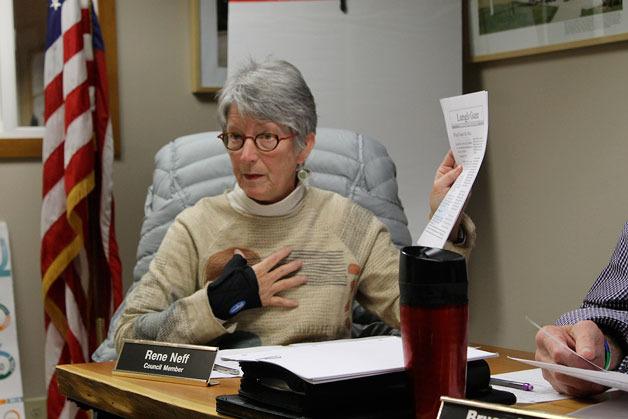For the evening walkers and 3 a.m. swimmers who use Seawall Park in Langley, there is hope yet.
On Monday, the Langley City Council made a surprise about-face when it tabled plans to close Seawall Park from midnight to 6 a.m. following a strong show of force by Langley residents and interested parties who opposed the decision made earlier this month. The council will schedule a workshop to continue the discussion, and the public is invited to attend and provide input.
“Just make sure you come to the workshop,” Councilman Bruce Allen said.
The decision was met with clapping approval from attendees. Residents and others who opposed the ordinance doubted the need for the park’s closure, which stemmed from syringes being found around the area, and felt their freedoms were being infringed upon. Some also felt the situation had been blown out of proportion, and that the hours were aggressive.
“Let people use the park at their free will,” Langley resident Steve Tremblay said. “Don’t take away our freedom because you’re afraid. We’re not afraid to go down there.”
Following a slew of comments from citizens, Allen and Councilwoman Rene Neff moved that the first reading of the ordinance be put on hold until further discussions occur. Neff said she was up in the air on how she wants to move forward.
“I think we’re still in the place of trying to sort it out and think about what’s best for this community,” Neff said.
While residents voiced similar opinions as expressed in previous meetings on the topic, there was an added twist in the meeting room of City Hall.
Sitting on each chair of the room was a copy of the “Langley Gazer,” a newsletter created anonymously that contained quotes from people who have voiced their displeasure with the topic at city council meetings since September.
The quotes included in the newsletter were ones for controversy. Some of the quotes seemed to encapsulate the views of those against the park’s closure, but included some incorrect facts, such as one quote that said police found 70 heroin syringes in Seawall Park over two weeks. Chief David Marks reported at a city council meeting in September that 40 were found.
Others had false assumptions, Neff said. Allen agreed.
“I object to this, actually,” Allen said.
The newsletter was among some of the frustrations expressed by Allen, Neff and Councilwoman Ursula Shoudy. In addition to the newsletter, which Neff said felt like an attack on the city council, they also were disappointed by a lack of effort by residents to discuss their concerns with them before creating it, as well as low attendance at standard council meetings.
Councilwoman Dominique Emerson, who was the lone opposing vote to the decision made at an Oct. 3 council meeting, proposed another alternative that would keep the park accessible, increase safety and provide opportunity for art. Reading from a prepared statement at the onset of the discussion, she proposed that the city approach First Street landowners to build a fence at the southern boundary of Seawall Park.
“This could be an attractive, artful fence or a practical compost fence,” Emerson said. “We would be ensuring that people don’t go up the bluff from the park. The fence saves the integrity of the bluff, which is very important and greatly reduces the access to the First Street park properties.”
Emerson added that the property owners would lose no property and that the fence could be removed if any development occurs.
Among the things to be discussed at the next workshop will be the proposed hours of closure, whether they should be adjusted on a seasonal basis and whether a violation of the potential ordinance would result in a misdemeanor or a civil infraction.



